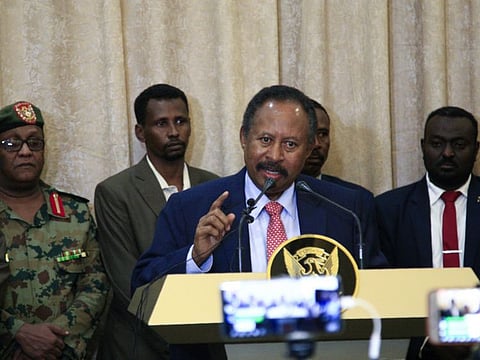Sudan prime minister's priorities are peace and economics
Hamdok is determined to end violence, restore stability and build prosperity

Peace and stability are commodities that have been in short supply in Sudan for the past three decades. The military took power in 1989 and, through their installation of Omar Al Bashir and his consolidation as the former president, it has been the people of Sudan who have suffered. The rule of Al Bashir brought divisions, economic chaos, corruption and misery. But there is at last hope that this sad chapter in Sudan’s long and proud history may be finally over.
On Wednesday, Abdullah Hamdok was sworn in as prime minister to lead a transitional government with the aim of holding free and fair elections in a little more than 36 months’ time. For the Sudanese people, who have suffered through virtual economic collapse, shortages and seen their currency lose any intrinsic value as runaway inflation took root, that three-year time frame may seem like a long way off. But at least now they can take solace knowing that with Hamdok at the helm, things can improve.
During his swearing-in ceremony, Hamdok acknowledged that the road ahead will have its difficulties and challenges. But he has vowed to making a long-lasting peace a priority, so too solving Sudan’s deep-rooted economic problems. As a respected economist with experience at both the United Nations and the International Labour Organisation, Hamdok knows better than most the challenges facing Sudan — and how to best meet those difficulties.
On its southern border, in disputed lands and in a region that contains proven petrochemical deposits, peace has been hard to come by. Clashes with South Sudan and an inability to ease the tensions that exist within Sudan and just beyond its borders, have meant an abundance of violence and long-term misery.
Hamdok is determined to bring order to Sudan’s economy. His steely determination and professional experience at the very heart of organisations exposed to the reality of African and Sudanese economic affairs, make him well suited to being able to deal with the World Bank and the International Monetary Fund.
In dealing with international organisations, Hamdok will need to navigate the negative reputation his nation has earned from decades of Al Bashir’s rule. He will need first to convince Washington that his nation, now embarking on a new dawn, has no role to play in sponsoring extremists. Certainly, his credentials and long experience beyond Sudan’s borders will help. But Hamdok and all Sudanese should be assured they have many friends across the Arab world.



